Father Of Teenager Killed By Iranian Regime Slams Injustice
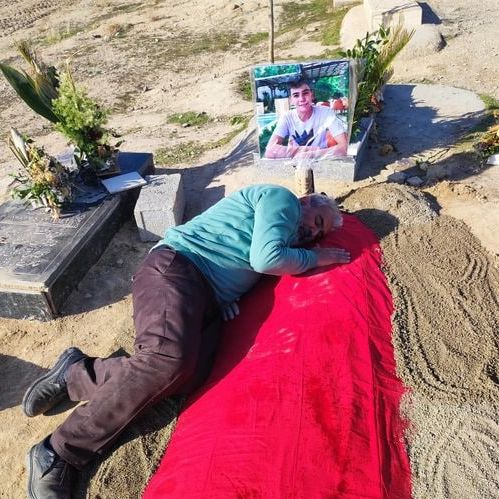
The father of a boy killed in Iran protests has lashed out at the judiciary saying that all Iranians are watching “the unjust actions” and justice will soon be served.

The father of a boy killed in Iran protests has lashed out at the judiciary saying that all Iranians are watching “the unjust actions” and justice will soon be served.
The father of Abulfazl Adinezadeh, a 17-year-old teenager who was shot dead by 24 bullets in the religious city of Mashhad, harshly condemned the execution of protesters ordered by Gholam-Hossein Mohseni Ejei, Iran’s Chief Justice.
“How is it possible that you issue a death sentence for the death of a Basij militiaman within 23 days, but in my son’s case, the murderer has not been identified after 70 days and you have not allowed our lawyers to investigate the case,” he said in an Instagram post.
Iranian security forces killed Abolfazl Adinezadeh by firing a shotgun at him at point-blank range in the city of Mashhad on October 8. He died as a result of liver and kidney damage caused by birdshot, according to the BBC.
Saeed Eghbali, a human rights activist and political prisoner, in an audio file sent to Iran International from a prison near Tehran, asked people to keep holding demonstrations to stop the execution of protesters in Iran.
Earlier, Amnesty International announced in a statement that at least 26 people who were arrested during the uprising against the Islamic Republic are at risk of execution.

Employees and workers at some industrial and operational units in Iran’s oil sector have gone on strike in several cities in the south of the country.
The protest actions have reportedly taken place in Mahshahr, Ahvaz, Asaluyeh, Gachsaran and Tang-e-Bijar.
Firefighters in Kharg Island and the staff of a chemical studies Company in the southern oil-rich regions have also stopped working on Saturday.
The Telegram channels of the Council for Organizing Oil Contract-Workers' Protests as well as the Free Workers’ Union have published details and photos of these protests.
According to reports, the strikes were held in protest to inattention to the demands of these workers, including higher wages and retirement bonuses.
In its latest statement, the Council for Organizing Oil Contract-Workers' Protests called for a nationwide strike by the workers saying that the move is to protest “lack of job security.”
The strikes are also seen as support for ongoing anti-regime protests. “We all know that executions and repressions serve to enslave us more, and workers would suffer the consequence,” reads the statement.
During the nationwide protests in Iran in the past three months, workers, and employees in various industrial, production and energy sectors have held numerous protest gatherings and strikes.
Low wages, non-payment of arrears, and inattention to their demands have been mentioned as among their main grievances.
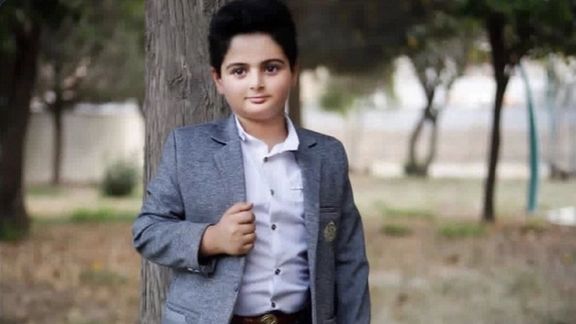
Three months into antigovernment protests in Iran, expression of international support continue, emphasizing that the regime must be held accountable for its crimes.
US State Department Deputy Spokesperson, Vedant Patel said the eyes of the world are upon Iran right now – and human rights violations – inflicted by Iran’s government on its own people must not go without consequence.
He told a press briefing on Friday Washington is gravely concerned that authorities reportedly continue to kill more of their own people in an effort to suppress peaceful protests.
“We also continue to remain deeply concerned about reports of mass arrests, sham trials, and now death sentences being handed down to protesters and carried out as well,” underlined Patel.
He further reiterated that the JCPOA is not the focus right now, and the US candidly remains very skeptical of anything coming out of Tehran on this issue, whether it be issues relating to the IAEA or other things.
Meanwhile, President of the European Parliament, Roberta Metsola expressed solidarity with Iranians in a Tweet Friday saying “the women, men and all those protesting in the streets of Iran have inspired the world. We have stood by you and will stay with you.”
The US-based Human Rights Activists News Agency (HRANA) announced in its latest report that from September 17 until Friday, December 16, at least 495 protestors have been killed, of which at least 68 were minors.
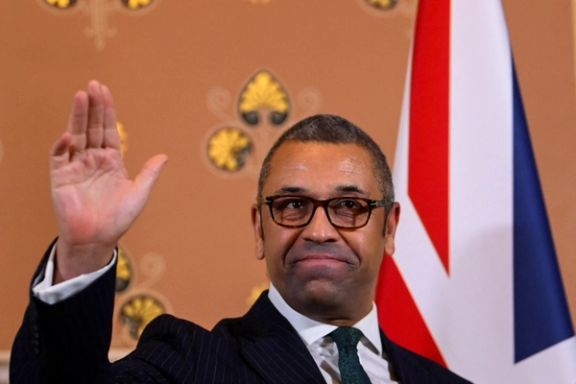
British Secretary of State James Cleverly says his country has sanctioned more than 40 officials of the Islamic Republic since the beginning of the protests in Iran.
UK’s foreign policy chief said in a tweet on Friday that “Three months ago today, Mahsa Amini died after her arrest by Iran’s 'Morality Police'. Since then, we've sanctioned over 40 Iranian officials.”
He further added that in total, the UK has sanctioned over 300 people and entities, including the IRGC in its entirety.
Nationwide protests that erupted after the death in police custody of 22-year-old Kurdish Iranian woman Mahsa Amini on September 16 have posed one of the biggest challenges to the Islamic Republic since its establishment in 1979.
Britain announced sanctions December 9 against 30 people worldwide, including Iranian officials, for serious rights violations, such as the violence on protesters.
Iran executed the first detained protester December 8 after a sham trial, sparking worldwide outrage and condemnations. The execution is seen as part of a government strategy to intimidate ordinary people and activists from pursuing the almost three-month-old antigovernment protests movement.
In mid-November, Britain had slapped a new round of sanctions on 24 Iranian officials who played a role in cracking down on protests.
In a press release the United Kingdom announced that the “sanctions target officials within the Iranian regime who are responsible for heinous human rights violations.”
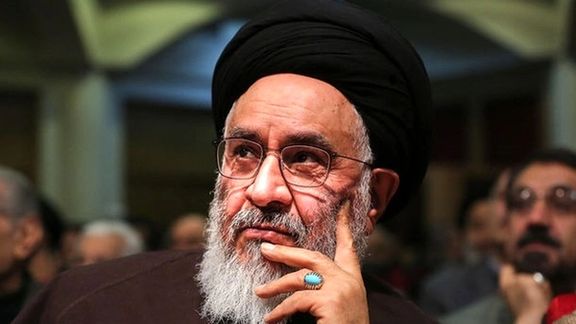
A few days after the execution of two detained protesters, a prominent cleric in Iran has voiced his objection to excesses and called for fair treatment of inmates.
At the same time, tens of Friday prayer Imams as well as some other hardliner clerics supported the executions and demanded longer prison sentences for protesters. One Imam, firebrand Ahmad Khatami in Tehran said that Supreme Leader Ali Khamenei “speaks for God Almighty” and that his orders should be obeyed as sacred words.
Khatami added that confronting Khamenei is tantamount to standing against God and his saints and prophets.
Elsewhere in Iran, another cleric, a member of the Assembly of Experts, Abbas Ka'bi supported the protesters' execution and said at the Qom Seminary that protesters disrupt public security and thus they fight God and should be executed.
Many Iranian clerics as well as Muslim scholars in Iran and other countries have objected to the execution of protesters on religious grounds of punishing those “who fight God.”
Meanwhile, another hardliner, Ahmad Alamolhoda, who represents Khamenei in Khorasan Province in northeast Iran said on Friday that those who chant, "Woman, Life, Freedom" are godless. He also described those who are against compulsory hijab in Iran as "mercenaries."
Alamolhoda, who is the father-in-law of President Ebrahim Raisi, further claimed that God belongs to the Islamic Republic and that there is no God for the enemies of the clerical regime in Iran.

Confronting the extremist clerics, Ayatollah Mostafa Mohaqeq Damad, the Chairman of the Islamic Studies group at the Iran Academy of Sciences has criticized the hardliners who call for maximum punishment, saying that individuals who have no legal knowledge of justice are forcing themselves upon the Judiciary .
Damad was also referring to a majority of Iranian clerical judges who happen to be ruling at the revolutionary courts, accusing them of lacking the academic background required for anyone who wants to be a judge.
After the establishment of the Islamic Republic in 1979, people with minimal educational background were appointed as judges as political appointees of the ruling clerics. As a result, many defendants and lawyers have pointed out that judges take their orders from the security forces and in fact the verdicts issued for political prisoners come from the intelligence organizations.
Damad also condemned the "unforgiveable" executions in the first years of the Islamic Republic as a stigma on the face of the Islamic government in Iran. He added that history will not forget the bloods spilled because of unfair and illegitimate punishment.
During the past three months as security forces have sent thousands of protesters to jail for taking part in protests, many inmates and their families have voiced concern about harsh treatment and brutality in Iranian jails and courts. Many inmates have complained that they have been denied the right to be represented by lawyers. As an example, Mashaallah Karami, whose son Mohammad Mehdi is in jail and sentenced to death told Etemad online that they have not been allowed to have their own lawyer. The court has appointed its own lawyer who does not answer his phone calls. Karami added that the revolutionary court tells the families that their children have apposed God and his prophet, while they were demanding democracy and freedom.
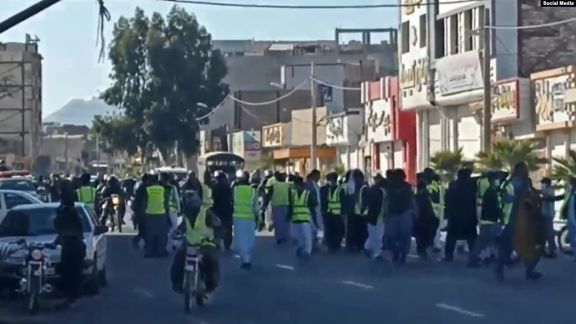
A prominent dissident Sunni Muslim cleric Friday urged Iranian authorities on Friday to free thousands of detained protesters and stop executions.
As the three-month-old unrest churned on with street marches in the restive southeastern province of Sistan-Baluchestan, outspoken Sunni cleric Mowlavi Abdolhamid criticized the death sentences handed out to the arrested protesters.
"We compassionately recommend that you release the recent prisoners who were detained during these protests and not treat them harshly. Most of them are young and very young. Free the young men and women," Abdolhamid said.
"Don't charge them with (capital offences), and if they are, they should not be sentenced to death and put to death," the cleric said in a Friday prayers sermon.
After the sermon, demonstrators took to the streets of Zahedan, capital of the impoverished Sistan-Baluchistan province in the southeast. "This nation wants freedom, it wants a prosperous country!" they chanted, in videos posted on social media.
Earlier in the day, Amnesty International said 26 individuals faced possible execution after the Islamic Republic hanged two people arrested over the protests that erupted after the death in police custody of young Kurdish Iranian woman Mahsa Amini on September 16.
“At least 26 people are at great risk of execution in connection with nationwide protests after Iranian authorities arbitrarily executed two individuals following grossly unfair sham trials in a bid to instill fear among the public and end protests,” Amnesty said in a statement. "Of the 26, at least 11 are sentenced to death and 15 are charged with capital offences and awaiting or undergoing trials," it added.
The 26 individuals have all been denied fair trials, including the rights to adequate defense and access to lawyers of their choosing; to be presumed innocent; to remain silent; and to receive a fair, public hearing, the statement read. According to information available to Amnesty International, at least 10 of them, including Hamid GhareHasanlou, Toomaj Salehi and Mohammad Ghobadlou were tortured, and authorities used their torture-tainted “confessions” or those of others as evidence. State media also broadcast forced “confessions” of several defendants prior to their trials.
The rallies continued in other parts of Iran, as unidentified attackers damaged a mosque in western Lorestan province early on Friday by throwing petrol bombs.
According to the US-based Human Rights Activists News Agency (HRANA), 495 protesters have been killed as of Thursday, including 68 minors. Sixty-two members of the security forces have also been killed. It said more than 18,400 are estimated to have been arrested.
Protests against the Islamic Republic were also held Friday in several cities across Europe as well as Australia and New Zealand.
International measures against the regime are also growing. On Wednesday, the Islamic Republic was ousted from a United Nations women's commission for policies contrary to the rights of women and girls, a move proposed by the United States.
The move was the first time in United Nations history that a country was expelled from the commission, and the second blow to the Islamic Republic over its brutal crackdown on protests sparked by the death of Mahsa Amini in custody of hijab police. The first step to hold the Islamic Republic accountable was creating a fact-finding mission by the Human Rights Council. The Geneva-based UN Human Rights Council voted on November 24 to launch an independent investigation into the regime’s deadly repression.